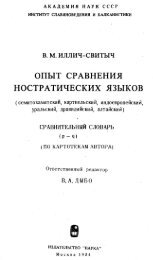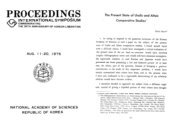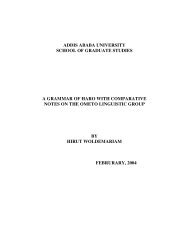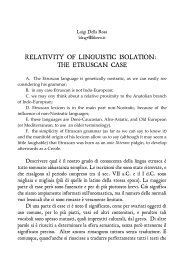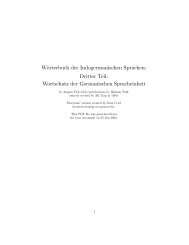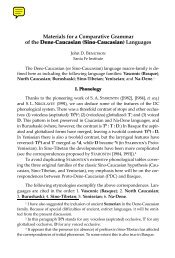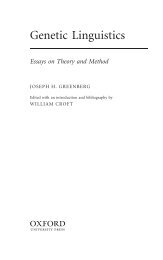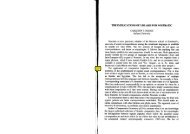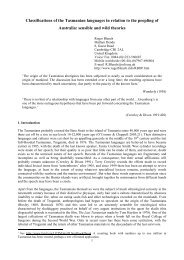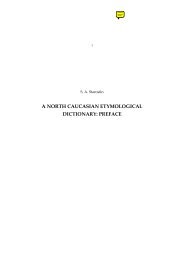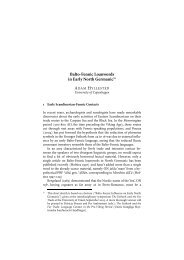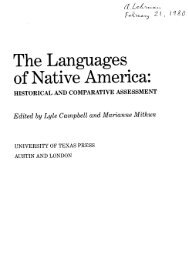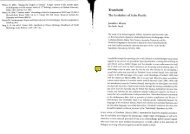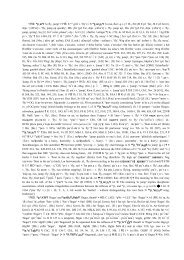The Indo-European Elements in Hurrian
The Indo-European Elements in Hurrian
The Indo-European Elements in Hurrian
You also want an ePaper? Increase the reach of your titles
YUMPU automatically turns print PDFs into web optimized ePapers that Google loves.
44 4. Nom<strong>in</strong>al Morphology<br />
papan-ni ‘the mounta<strong>in</strong>’ has no marker. In general, <strong>in</strong> the Hurro-Hittite bil<strong>in</strong>gual discovered <strong>in</strong><br />
1983, words appear<strong>in</strong>g <strong>in</strong> the Ergative case are persons, but <strong>in</strong>animate objects like papan<br />
‘mounta<strong>in</strong>’ or kaballi ‘copper’ are also attested <strong>in</strong> the Ergative case. One of the most <strong>in</strong>trigu<strong>in</strong>g<br />
sentences is this one, where the subject is unexpectedly <strong>in</strong> the Absolutive case: < m Me-e-ki-ne-e<br />
ti-bé-na d IM-ub-u-ta; ku-un-zi-ma-i ka4-ti-ya> (Kbo 32.15 Vo IV 12—13) ‘Meki the words<br />
toward Teššub kneel<strong>in</strong>g says’. Meki, a person, is not marked <strong>in</strong> the Ergative case, <strong>in</strong> spite of<br />
be<strong>in</strong>g the subject. <strong>The</strong> verb kadi ‘to say’ has, nevertheless, an explicit object tiwe-na ‘the<br />
words’. <strong>The</strong>re are several examples of this construction. But anyway, words do not kneel, and<br />
they do not speak; only Meki would kneel and speak. <strong>Hurrian</strong> seems to dispense with grammar<br />
when possible. Another item is KBo 32.13 Ro<br />
I 12-13 ‘A feast magnificent did the goddess Allani organize’. <strong>The</strong> verb is transitive (-i-b), but<br />
the subject bears no Ergative case marker. Speiser himself <strong>in</strong> (1941:108) had noticed that the<br />
“Agentive” suffix was sometimes dispensed with, as <strong>in</strong> KUB XXV 42 v 6, where<br />
is expected, which accounts for his reservations about <strong>Hurrian</strong> be<strong>in</strong>g an<br />
Ergative language. On the whole, this can also “reflects the effort which <strong>Hurrian</strong> made to keep<br />
the subject <strong>in</strong> the forefront of the utterance”, as noted by Speiser (1941:206). To some extent,<br />
this means that the case-markers ma<strong>in</strong>ly confirm the grammatical functions of the words, which<br />
are expected from their relative positions <strong>in</strong> the sentence.<br />
As already mentioned, the object is usually unmarked, even when it refers to an animate,<br />
like a ‘deer’ : ‘the deer (to) the other<br />
mounta<strong>in</strong> moved’ (Kbo 32.14 Ro I 2—3), where nali ‘deer’ is subject, can be compared with<br />
‘may the hunters fell the deer’ (Kbo 32.14 Ro I), where<br />
nali is object, with no formal change.<br />
So it seems that the case is closed and that <strong>Hurrian</strong> is an Ergative language, and it should<br />
not have an Accusative case at the same time. But then, some sentences seem to contradict this.<br />
For example, <strong>in</strong> the Mitanni letter, Mit. I 114—115:<br />
114. I [Gi]-li-i-an [pa-aš]-ši-i-it-¯i-ib-wə I [Ma-ni]-en-na-a-an [pa-aš]-ši-i-it-¯i-ib<br />
Giliium ambactum meum Man<strong>in</strong>am ambactum tuum<br />
115. [na]-ak-ku-ša-a-ú ú-ú-na-a-al-la-a-an še-e-ni-ib-wə-ta<br />
missi veniendos ad fratrem meum.<br />
<strong>The</strong> end<strong>in</strong>g -an is usually translated as ‘and’, ma<strong>in</strong>ly because the standard approach of<br />
ergativity is that it should exclude an Accusative. Is this not a clear case of Accusative, with<br />
both Gilia and Mani be<strong>in</strong>g <strong>in</strong> the Accusative s<strong>in</strong>gular and the participle of the verb una- ‘to<br />
come’ be<strong>in</strong>g <strong>in</strong> the Accusative plural -alla-a-an? <strong>The</strong> translation made by Wilhelm abides by<br />
the option that -an is ‘and’: 72 ‘And Gilia, my envoy, and Mani, your envoy, I sent them and they<br />
are com<strong>in</strong>g to my brother’. But here, this translation seems to miss someth<strong>in</strong>g of the real<br />
structure of that sentence, where the Accusative marker is elegantly reconnect<strong>in</strong>g Gilia, Mani,<br />
and the verb una- <strong>in</strong> the next l<strong>in</strong>e. Another <strong>in</strong>trigu<strong>in</strong>g case of reconnection by the Accusative<br />
marker is this sentence from Mit. IV 33—34:<br />
72 In French <strong>in</strong> Moran (1987:141).



